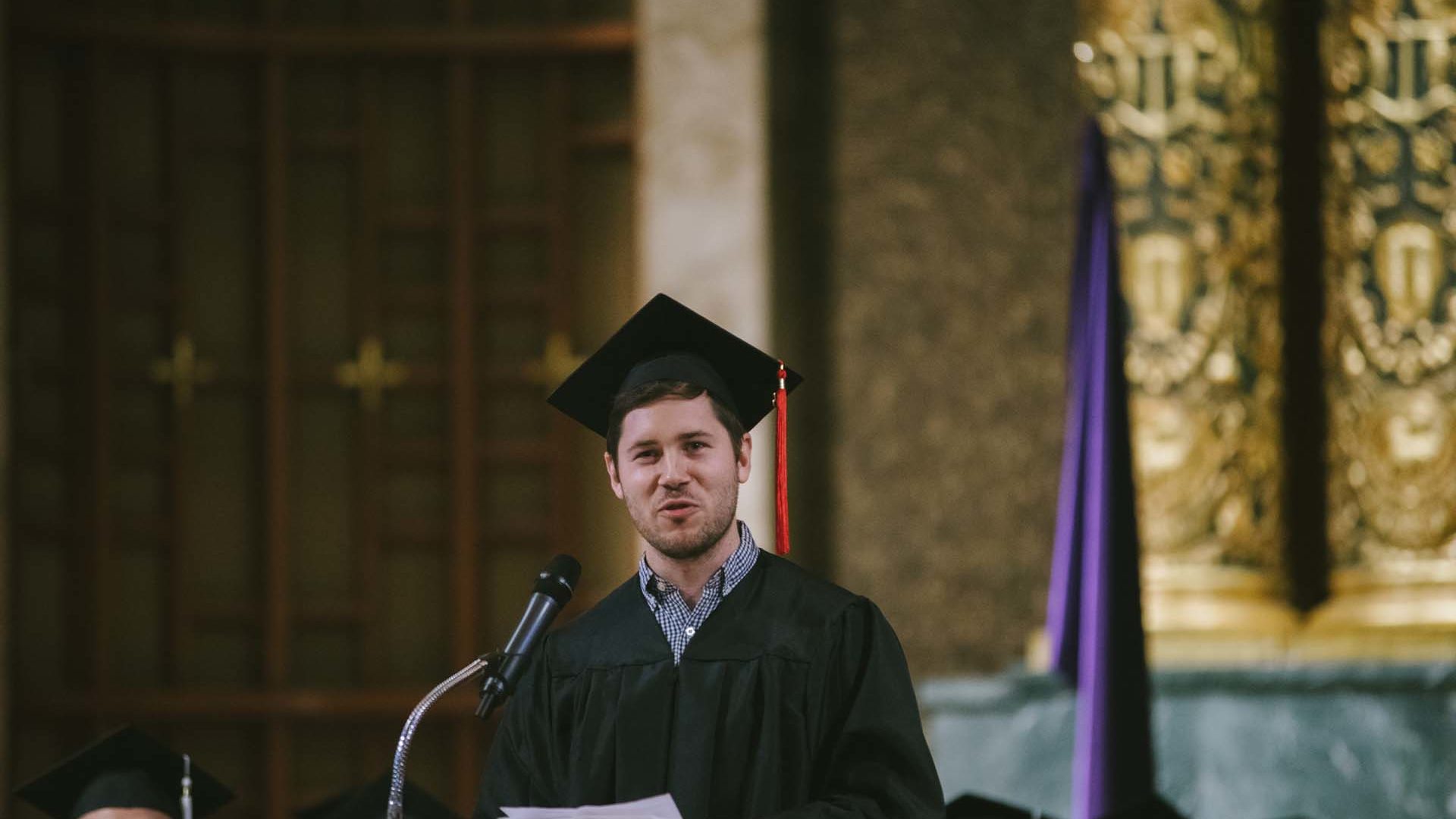Every year at Commencement, the graduating class and faculty select three students—one from each degree program—to offer words of blessing and calling. Here, we’re sharing the full video and text of the speech by Alex Mrakovich, Master of Divinity, about his time at The Seattle School and the call to be a singing people in a world of fear and heartache. You can also view the speeches from Heather Casimere (MA in Theology & Culture), and Matthias Roberts (MA in Counseling Psychology).
This all began with a small ache, a longing buried deep within. It all began with the desire for something real, something expansive. Feeling the winds of change on the horizon, something stirring within us, something that would not be silenced or easily dispelled, my wife and I, along with our miniature poodle Marco, packed up our life and embarked on the long journey from Chicago to The Seattle School of Theology & Psychology. I remember the tangible weight of fear and uncertainty, the feeling of leaving the familiar for a world of open-ended questions. Who am I? Who are you? Where is God present in the world? I was scared.
I wondered what would happen as I peeked behind the veil of my story, of my formation. And to explore not just my story, but the places in which our stories reside, the often untold stories of America and the extensive project of Western civilization. So many questions coalescing into a mountain of trepidation and terror, and yet, even in the midst of such fear, there was this ache, an ache of possibility. This sacred and intimate longing tucked away within the soil of my heart. To pull words from the musical lexicon of Bruce Springsteen, “I’m just a scared and lonely rider, but I gotta know how it feels. I want to know if love is wild. I want to know if love is real.”
Despite my best efforts, I became haunted by the Jesus who raises the dead ones to life and the Spirit who births life in impossible places. Inviting this reluctant prophet, this reluctant priest, in the words of the psalmist, to sing a new song. Learning to sing a new song requires one to enter the precarious and terrifying space of healing. A space of profound vulnerability and risk where old postures and ways of being go to die in order for new life to emerge. It is painful—and it is stunningly beautiful. I remember first bringing my story to Practicum, nearly four years ago. Having 20 minutes to tell it, I took up only 4, as Dr. Hollins was quick to point out. She looked at my face with a fierce kindness, inviting me to peel back the layers of my own beautiful and tragic story. Thank you for that gift.
“Learning to sing a new song requires one to enter the precarious and terrifying space of healing.”
There are the sweet memories of cultivating sacred spaces within our building. Holy moments where many of us in this room gathered at a common table. Tables for tears and laughter, tables for celebration and lament. I recall conversation after conversation, with fellow misfits, dreamers, poets, and healers. With you, my mentors, my teachers, my friends. Together we were conducting a kind of musical study. Exploring what it might mean to sing a subversive song, a prophetic song, a blues song that cries out, “How long oh Lord, how long?” I wonder what song each of us has learned to sing in this uncommon season?
What is your song? Perhaps it has been a song to ground us and hold us in the midst of struggle and heartache. Perhaps it has been a song that awakens us and move us out into the world with courage, resilience, and a longing for justice. And so my sisters and brothers, my beautiful, kind, and fierce friends, may we be a singing people as we leave this place. Let us carry with us songs of healing into the world. In the midst of such fear and uncertainty, such brokenness and despair, let us sing that song of love. That song of wild love that drives out all fear.
Amen.


